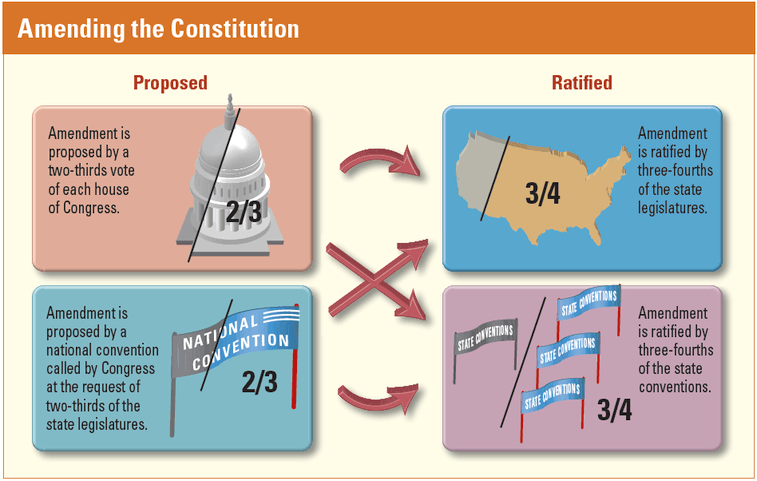The case that established the power of judicial review.
Marbury v. Madison.
True or false? Thomas Hobbes believed men are naturally good and can rule themselves.
False. John Locke believe man was good.
The document that was the newly independent colonies' first attempt at creating a central government.
The Articles of Confederation.
The conclusion that said that three out of every five slaves were counted when determining a states population.
3/5 Compromise.
What are the three branches the Constitution established?
Legislative, executive, and judicial.
The courts are vested with the authority to determine the legitimacy of the acts of the executive and the legislative branches of government.
Judicial review.
The term for when you give up some rights for order and security.
a. Separation of powers
b. Rule of law
c. Preamble
d. Social contract
e. Natural rights
d. Social contract
True or false? There was a new shift in idea of government. The government was once a protector and changed to a restrictor.
False. The framers goal was to create a government that was going to protect the rights of the people, unlike the government of Great Britain.
The name of the man who took detailed notes at the convention and was later an author of many of the federalist papers.
James Madison.
What bill made the anti-federalists happy when they were scared their rights and liberties would be taken?
What two clauses were involved in the case of McCulloch v. Maryland?
The Necessary and Proper Clause (Congress can make a bank) and the Supremacy Clause (Maryland cannot tax a federal bank).
The term for power and authority of government belonging to the people.
Popular sovereignty.
Which was NOT a weakness of the AofC?
a. 1/2 to pass laws
b. Lacked power to collect tax
c. Lacked power to regulate interstate commerce
d. No military power
e. Unanimous support to amend the Articles
a. 1/2 to pass laws
What two houses did the CT or Great Compromise create?
The House of Representatives and the Senate.
Who approved the Constitution first, the delegates or the citizens?
The delegates.
The other name for the Necessary and Proper Clause that emphasizes the nature and excessive use of this section of the Constitution.
The Elastic Clause.
Describe the difference between participatory and pluralist democracy.
In participatory, independent citizens are directly involved in political decisions and policy. In pluralist, group based activism impacts political decision making.
What state did Shay's rebellion take place where farmers were upset over the levied taxes and revolted, with no military power to stop them?
Massachusetts.
Out of the VA and NJ plan, which one was which? One said that all states are equal and one said that the larger the population of the state, the larger the say.
VA said bigger population, bigger say. NJ said every state is equal.
How many ways are there to go about the amendment process of the Constitution?
a. 1
b. 2
c. 3
d. 4
e. 8
d. 4
Which case came first, McCulloch or Marbury?
Marbury, which was in 1803. McCulloch was in 1819.
What theory of democracy does this cartoon show?

Elitist democracy.
Define unicameral legislation.
Type of legislature that consists of only one house, chamber, or body that makes decisions.
The AofC had a weakness of a unicameral Congress that gave each state one vote regardless of population.
The amount of years the Slave Trade Compromise established that limited the federal government from acting on slavery.
20 years.
How many federalist papers are there?
85.
